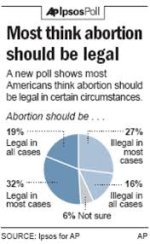Bold Choices, Hard Questions: The Truth About Abortion Rights
The question of whether abortion should be legal in all circumstances continues to ignite fierce debate across the globe. It’s a topic that cuts across politics, religion, gender rights, and human dignity. But to understand this issue in its complexity, we must look beyond moral panic and dive into facts, ethics, and autonomy.
At the core of this debate lies a fundamental question: Who gets to decide what happens to a woman’s body? Advocates for full abortion rights argue that reproductive autonomy is non-negotiable. If a woman is not allowed to control whether or not to carry a pregnancy, her freedom is essentially compromised. It's not just about reproductive choice—it's about equality, healthcare, and basic human rights.
Opponents often cite moral or religious grounds, arguing that life begins at conception. But here's the problem: not all pregnancies are the same, and not all circumstances are fair. What about pregnancies resulting from rape, incest, or abuse? What about women whose health—or lives—are at risk due to complications? What about fetuses diagnosed with fatal conditions? In each of these cases, forcing a woman to continue a pregnancy isn’t just inhumane—it’s cruel.
Moreover, making abortion illegal doesn’t eliminate it—it just makes it dangerous. History has shown us that when abortion is criminalized, women don’t stop seeking it—they just die trying. Unsafe, underground procedures take the place of regulated, medically safe options. The consequences are devastating, especially for poor and marginalized communities who lack the means to travel or access private care.
Legality doesn’t mean coercion. No one is forced to have an abortion. It simply means the option exists for those who need it. A legal, accessible, and stigma-free environment is crucial to ensuring that women—and all people who can get pregnant—are treated with respect and allowed to make their own deeply personal choices.
To be clear: Abortion is healthcare. Abortion is a right. And in a just society, it must be legal—without exception. Because once we start allowing the government to control the most intimate parts of our lives, we’ve already lost more than we think.
The question of whether abortion should be legal in all circumstances continues to ignite fierce debate across the globe. It’s a topic that cuts across politics, religion, gender rights, and human dignity. But to understand this issue in its complexity, we must look beyond moral panic and dive into facts, ethics, and autonomy.
At the core of this debate lies a fundamental question: Who gets to decide what happens to a woman’s body? Advocates for full abortion rights argue that reproductive autonomy is non-negotiable. If a woman is not allowed to control whether or not to carry a pregnancy, her freedom is essentially compromised. It's not just about reproductive choice—it's about equality, healthcare, and basic human rights.
Opponents often cite moral or religious grounds, arguing that life begins at conception. But here's the problem: not all pregnancies are the same, and not all circumstances are fair. What about pregnancies resulting from rape, incest, or abuse? What about women whose health—or lives—are at risk due to complications? What about fetuses diagnosed with fatal conditions? In each of these cases, forcing a woman to continue a pregnancy isn’t just inhumane—it’s cruel.
Moreover, making abortion illegal doesn’t eliminate it—it just makes it dangerous. History has shown us that when abortion is criminalized, women don’t stop seeking it—they just die trying. Unsafe, underground procedures take the place of regulated, medically safe options. The consequences are devastating, especially for poor and marginalized communities who lack the means to travel or access private care.
Legality doesn’t mean coercion. No one is forced to have an abortion. It simply means the option exists for those who need it. A legal, accessible, and stigma-free environment is crucial to ensuring that women—and all people who can get pregnant—are treated with respect and allowed to make their own deeply personal choices.
To be clear: Abortion is healthcare. Abortion is a right. And in a just society, it must be legal—without exception. Because once we start allowing the government to control the most intimate parts of our lives, we’ve already lost more than we think.

